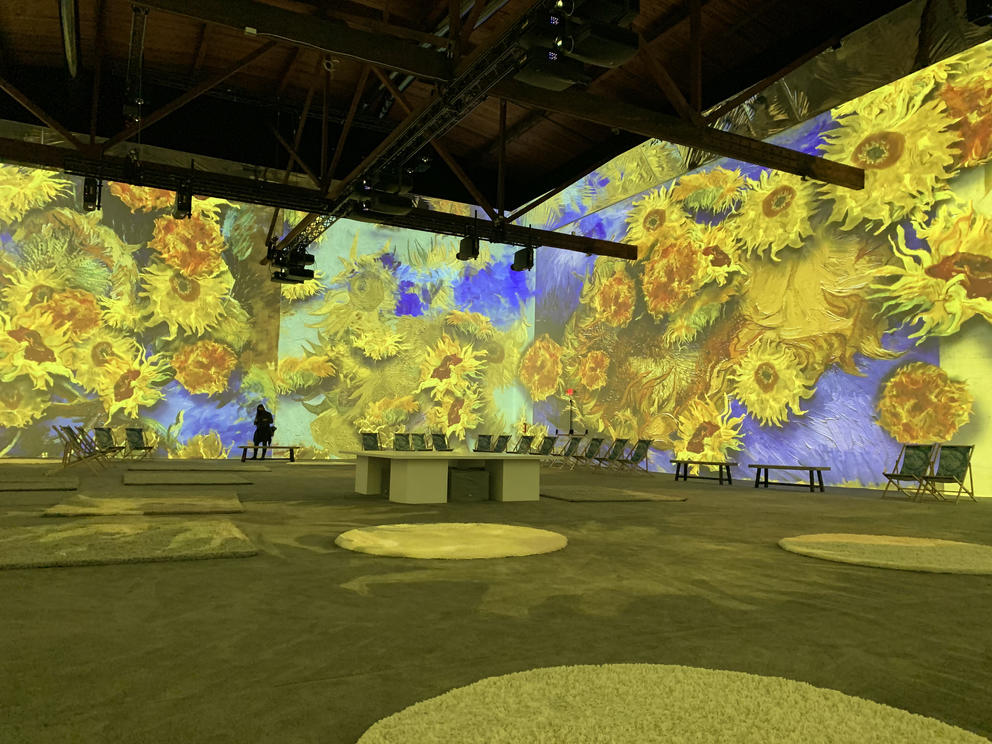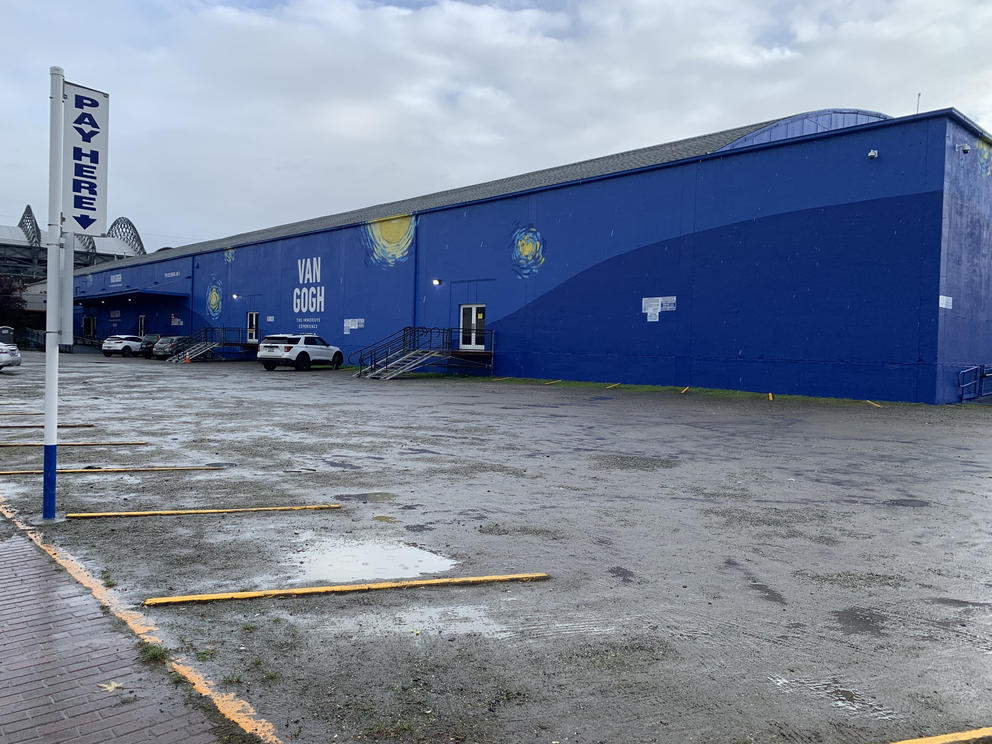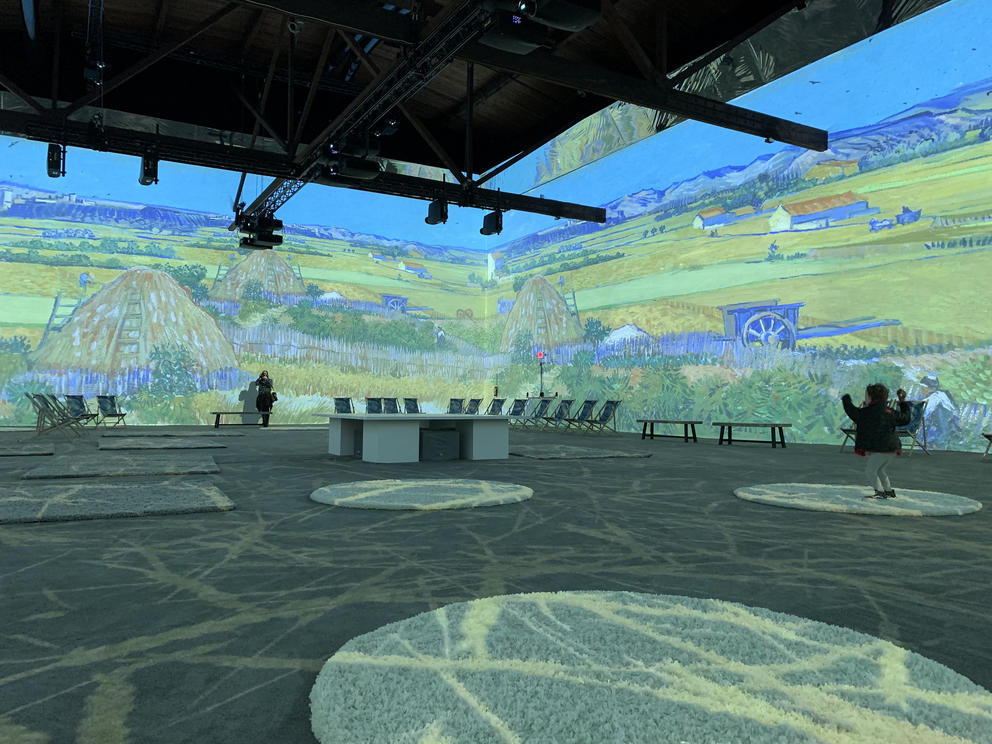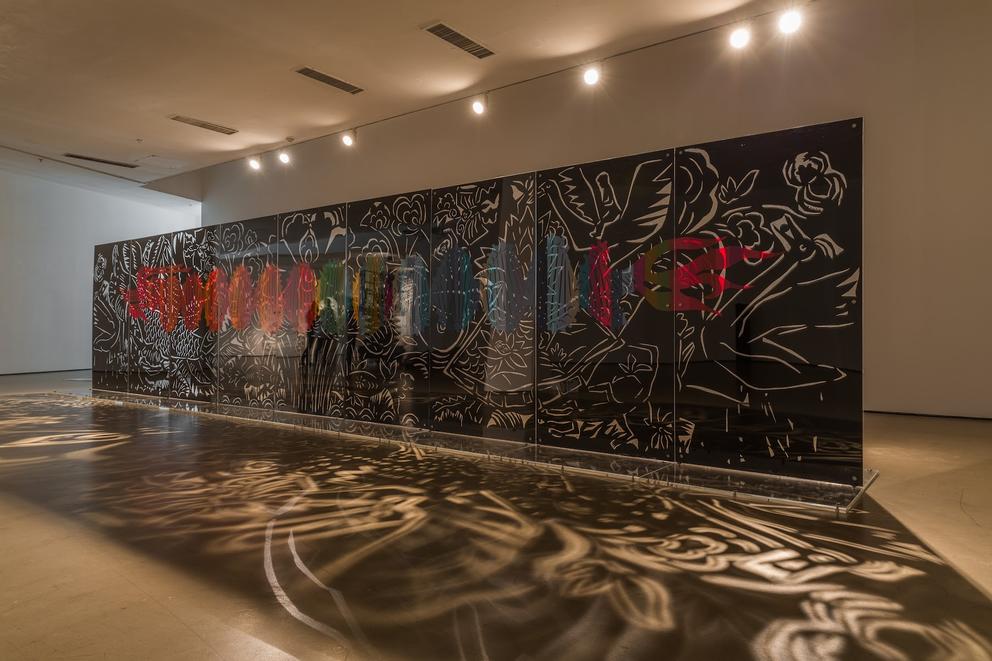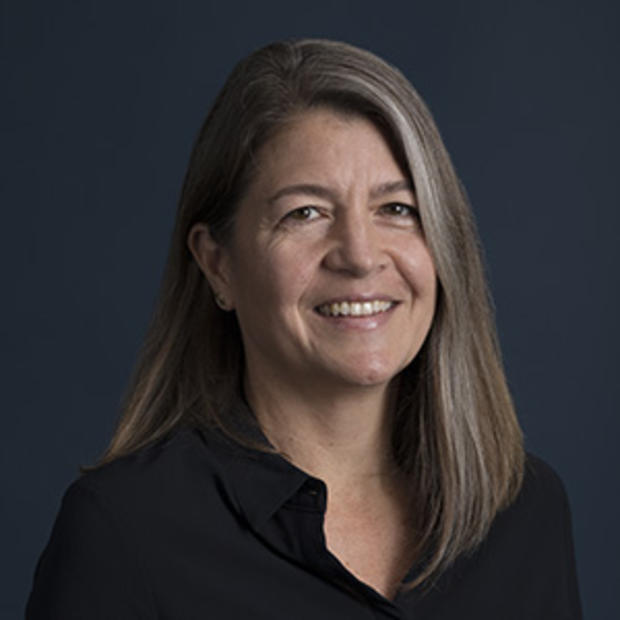While awaiting the arrival of my colleague Margo Vansynghel, I stood on the loading dock of the newly Van Gogh-blue SoDo warehouse that is hosting the show. That’s where I bumped into Bill Vipond and discovered that the dream of building a separate NBA facility for a revived Sonics basketball team is still alive.
ArtSEA: Notes on Northwest Culture is Crosscut’s weekly arts & culture newsletter.
Vipond’s real estate consultancy (which has managed the acquisition of many SoDo land parcels over the years, in anticipation of an NBA arena) has leased this 44,000-square-foot space to the Immersive Experience promoters for at least the next several months. But the longer-term hope — regardless of the new Climate Pledge Arena — is to house the Sonics in SoDo.
“You’d be standing at center court, right about here,” he told me.
This was not part of the tour, but it turned out to be the perfect mindset for the much-hyped Van Gogh show. I could imagine a red-bearded Go-Gogh mascot employing a T-shirt cannon to shoot “Starry Night” apparel at visitors.
The first thing you encounter inside the building is an insistent soundtrack — elegiac and unrelenting. The strings sweep ever higher as in a movie that is trying to make you feel something when the script cannot. The music is interspersed with a narrator reading Van Gogh quotes, which also appear on the walls:
“There is nothing more truly artistic than loving people.” “What would life be if we had no courage to attempt anything?” “If you truly love nature, you will find beauty everywhere.”
Excised from context and in such a large number, the quotes start to feel as flimsy as a free calendar. “It’s very #LiveLaughLove for someone who cut off his own ear,” Margo commented.
In the expansive dark hallway leading up to the big immersive moment, there is an oversized bust of Van Gogh onto which projections of his self-portraits are cast. I’ll admit it’s kind of cool to watch the images shift across it. There’s a short doc about how eyesight impairment may have affected his unusual color palette, a long-debated topic. There are two walls of canvas reproductions (sunflowers, irises, “Starry Night”) that are intensely lit, which makes them glowy, but also unfocused and flat.
Then there’s the immersion room — an ample two-story space open to the arched wooden ceiling of the old warehouse. Several dozen projectors are clustered like crows on a lighting rig above a wide circle of Van Gogh-branded deck chairs. The massive projections supposedly allow you to “step inside a painting,” but it’s more like stepping inside a screen saver of a painting.
Even with the paintings animated (sunflowers swirling, boats sailing, water cascading) and the strings playing their hearts out, I found it too far removed from the source material to be compelling. There’s nothing to distinguish these digital images from those reproduced on the $70 “Starry Night” yoga mats in the gift shop.
That said, the one small child among the press group squealed with delight and spun around like Mary Tyler Moore, caught up in wonder. And if the show inspires a kid to become an artist, well, terrific. Or maybe it prompts grown-ups to connect with art in a way they never have before. Also great.
But the thing is, Seattle has so much excellent original art on view — including at the already existing new sports arena.
If you seek immersion, read Margo’s recent story about several local art shows offering a significantly less commercialized experience. And if it’s influential painters you’re into, try Seattle Art Museum’s new show Frisson (through Nov. 27), featuring works by Mark Rothko, Lee Krasner, Francis Bacon and other legendary abstract expressionists — and witness their actual brushstrokes, right there on the canvas.
Exiting the Van Gogh show felt akin to taking off a virtual reality headset (and, yes, there is a VR option at the show, for an additional fee), because time spent in a virtual world always makes me appreciative of and eager for real-world experiences. Given all the digital whoop-de-do, I longed for simple pleasures, like paper formed into art.
Lucky me, the National Nordic Museum opens a new show of cut-paper works this weekend. Paper Dialogues: The Dragon and Our Stories (Oct. 28-Jan. 31, 2022) is a collaboration by Danish artist Bit Vejle and Chinese artist Xiao Guang Qiao. The exhibit of large and intricate cut-paper works illustrates how the dragon plays a role in both artists’ heritage — as an evil repellant in Viking symbology and an auspicious signifier in Chinese culture.
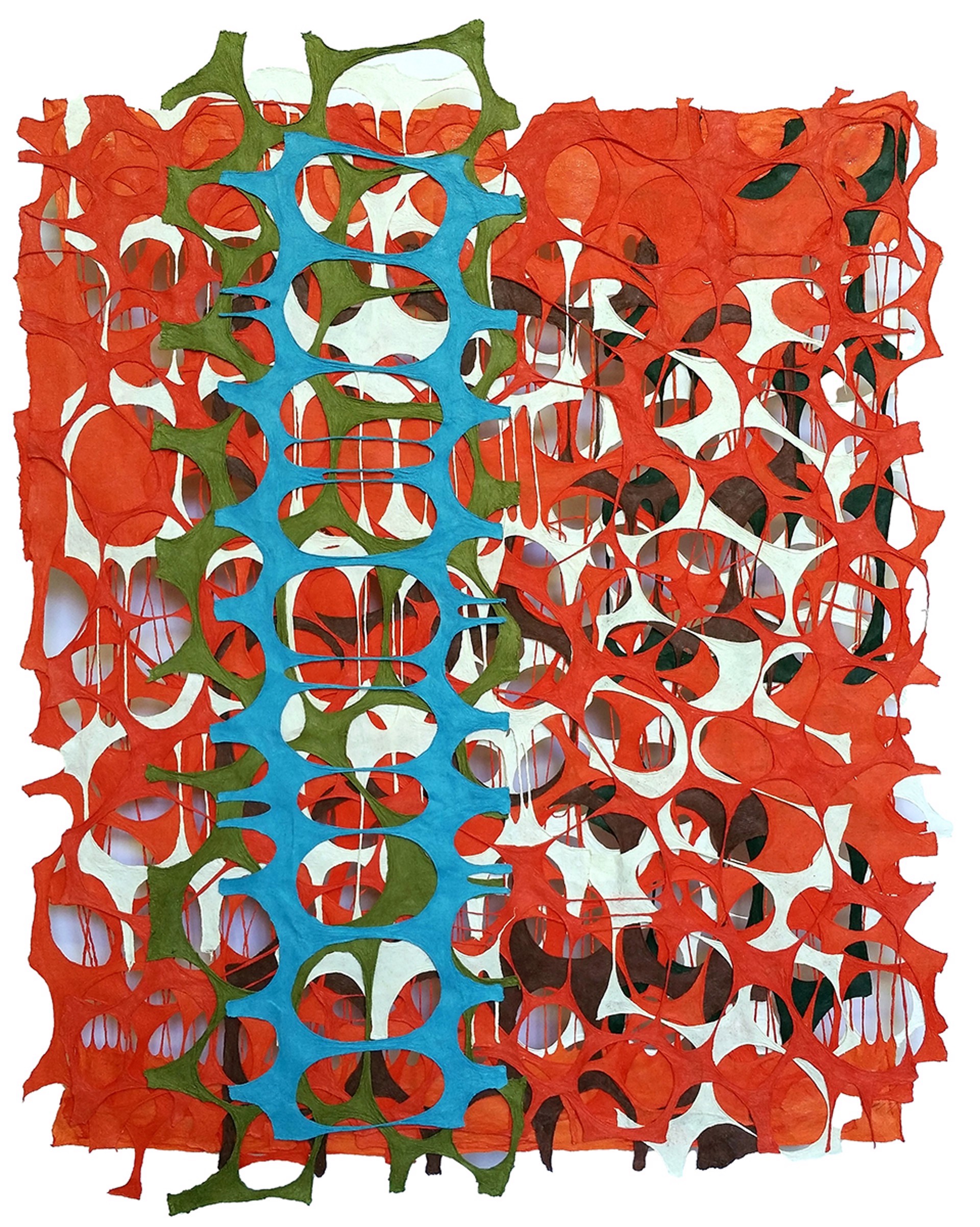
For more cut-paper power, here’s another reminder to catch two outstanding and ongoing exhibits by Seattle artist Barbara Earl Thomas: Packaged Black at Henry Art Gallery (through May 1, 2022) and The Geography of Innocence at Seattle Art Museum (through Jan. 2, 2022).
And last weekend, I visited two smaller exhibits that also showcase the plentiful possibilities of paper. At ArtXchange Gallery in Pioneer Square, Between and Within (through Nov. 20) showcases the beautiful work of Jiyoung Chung, who uses the traditional Korean method of joomchi — felted paper handmade from mulberry sheets — to construct highly contemporary, layered sculptures with an open, organic structure.
At the opposite end of the paper vibe are the mathematical, meticulously folded pieces by Yossi Ben Abu at From Typhoon on Capitol Hill. (Alert: The gallery will close its successful pop-up space at the end of this month and regroup with new plans for the new year.)
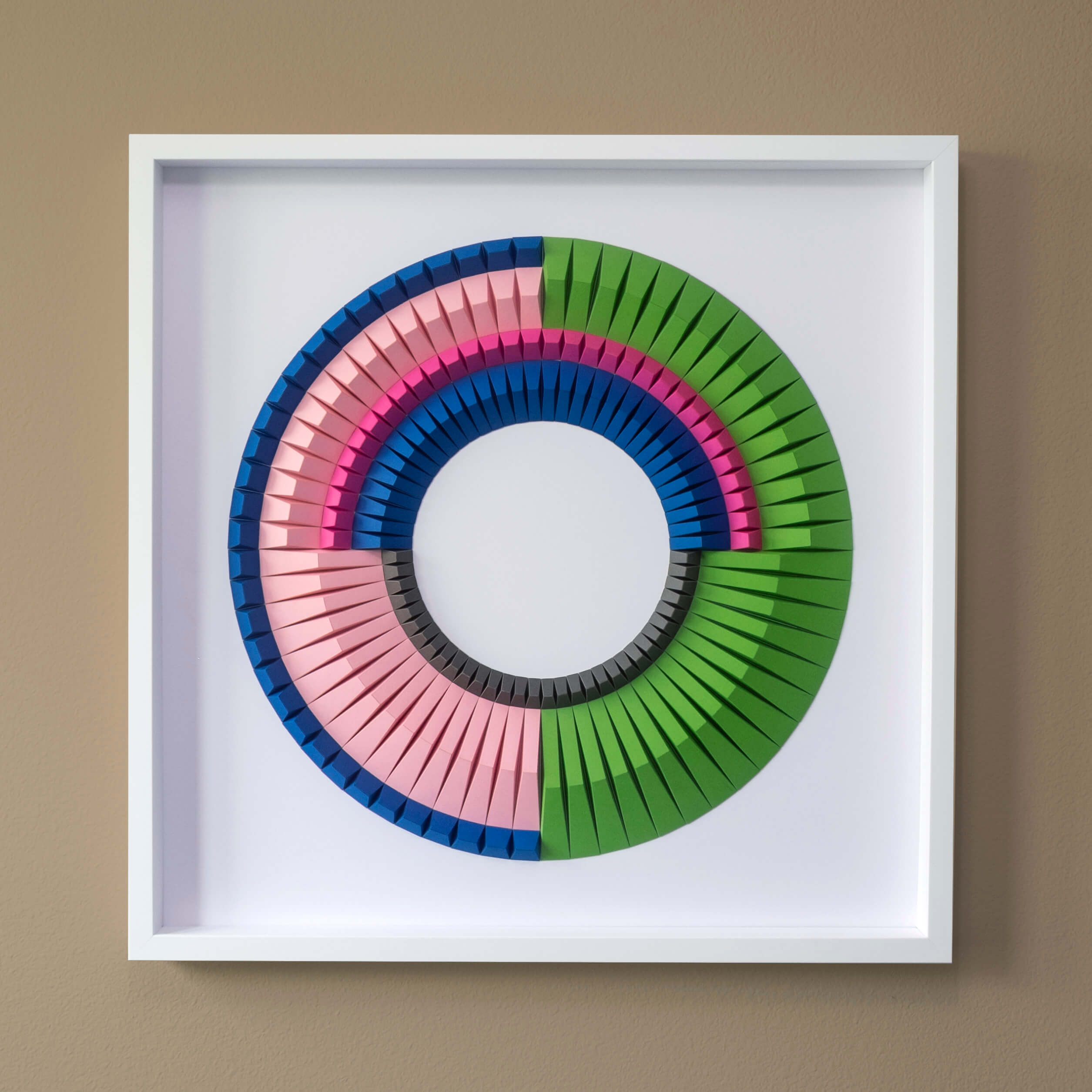
In By Mood (through Oct. 30), Ben Abu, who is deaf, shares visual messages he created for himself during the height of the pandemic, when masks made lip-reading impossible. His electric-hued, Pantone-style swatches of layered color read “Okey Dokey,” “Good Vibes,” “Let’s Dance” — textual and textural reassurances that, in the future, we’ll be able to connect in the real world once again.
Get the latest in local arts and culture
This weekly newsletter brings arts news and cultural events straight to your inbox.

